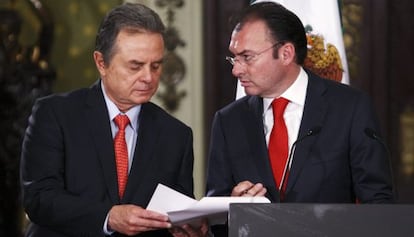Mexico debates rules to open energy sector to private investment
Move to improve productivity overcomes reticence to “sell out” nation’s most highly prized resource


The Mexican government this week sent the Senate a proposal for legislative reform that will grant private companies access to the country’s energy market for the first time in more than 75 years.
In a lengthy press conference, Finance Secretary Luis Videgaray and Energy Secretary Pedro Joaquín Coldwell expounded the details of a project to tweak 13 existing laws and create eight new ones that will be debated in the coming weeks in Mexico’s two legislative houses.
Both officials of the Enrique Peña Nieto administration underscored that hydrocarbons will continue to be the state’s property, even as the industry opens up to competition.
Although the energy reform approved in December 2013 gave the private sector access to hydrocarbon exploration, extraction, transformation, distribution and storage, the actual sale of gasoline will experience a gradual, years-long conversion process.
The reform is no small feat in a country where oil is a matter of patriotism
Coldwell explained that 49 percent of gasoline products currently sold in Mexico are imported, and that the subsidies they enjoy are “highly regressive.”
In a bid for greater transparency, the Institutional Revolutionary Party (PRI) government’s proposal includes public competitions to award licensing, production and service contracts to the most competitive private bidders.
Meanwhile Petróleos Mexicanos (Pemex), the state-owned oil monopoly, and the Federal Electricity Commission (CFE) will be allowed to manage their own affairs and handle their own budgets without state interference.
“The time has come for the Finance Secretary’s Office to take its hands out of Pemex and CFE,” said Luis Videgaray.
“There is a relevant dependence on oil revenues; this transition seeks, on the one hand, to free up resources, and on the other to protect the Mexican state’s spending,” said the finance minister.
To allay widespread fears about losing control over the country’s most highly prized resource, Mexican investor presence is guaranteed by law, which establishes a minimum 25-percent participation of national firms and preference for Mexican providers over foreign ones.
“We must no longer view Pemex as being a synonym for Mexico”
The press conference coincides with the release of Pemex’s quarterly results, which show losses of $2.8 million compared with $363 million over the same period last year. The company blamed the huge losses on lower sales and exports.
Pemex’s poor showings are part of the reason why Peña Nieto has decided to open up the industry to private investment. While he is not the first president to attempt such a move — Felipe Calderón tried in 2008, but lacked the necessary political consensus to push it through — he is the first to be successful at it.
This is no small feat in a country where oil is a matter of patriotism, and where the left claims that privatization amounts to selling out the country to foreign interests.
“I think the 2008 reform came up really short,” says Dante San Pedro, a lawyer with ample experience in the energy sector who helped draft former president Calderón’s reform project. “The most important thing about that reform is that it showed us we could change our energy legislation, particularly on oil issues. Things had not moved for many years, and in 2008 we proved that things could in fact be changed without bringing about the end of Mexico, or the fall of Pemex.”
Pemex’s quarterly results show losses of $2.8 million
Asked whether the current reform will reduce Pemex’s famously corrupt practices, San Pedro was doubtful.
“I think that another one of the issues that was left behind in the 2013 reform was to turn Pemex into a publicly traded company. The kind of transparency that the securities market forces upon you is of vital importance to any company,” he says. “Listed companies are forced to maintain a level of transparency that the market oversees. This kind of discipline would have been important for Pemex, even if only three percent of its capital had been floated.”
But above all, says San Pedro, “we must no longer view Pemex as a synonym for Mexico.”
“As Mexicans, we should be concerned about resource extraction taking place in the best and most efficient way to maximize the nation’s revenues.”
Tu suscripción se está usando en otro dispositivo
¿Quieres añadir otro usuario a tu suscripción?
Si continúas leyendo en este dispositivo, no se podrá leer en el otro.
FlechaTu suscripción se está usando en otro dispositivo y solo puedes acceder a EL PAÍS desde un dispositivo a la vez.
Si quieres compartir tu cuenta, cambia tu suscripción a la modalidad Premium, así podrás añadir otro usuario. Cada uno accederá con su propia cuenta de email, lo que os permitirá personalizar vuestra experiencia en EL PAÍS.
¿Tienes una suscripción de empresa? Accede aquí para contratar más cuentas.
En el caso de no saber quién está usando tu cuenta, te recomendamos cambiar tu contraseña aquí.
Si decides continuar compartiendo tu cuenta, este mensaje se mostrará en tu dispositivo y en el de la otra persona que está usando tu cuenta de forma indefinida, afectando a tu experiencia de lectura. Puedes consultar aquí los términos y condiciones de la suscripción digital.








































